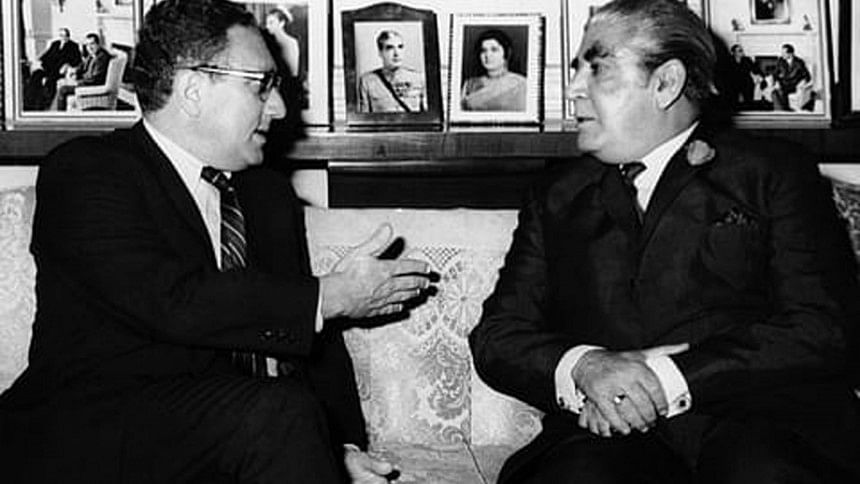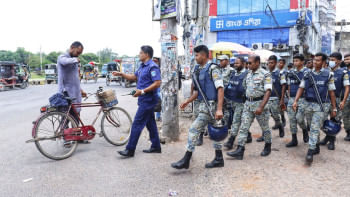The Kissinger-Yahya plot against Bangladesh’s liberation

The Pakistan Army's genocide in Bangladesh, launched as part of Operation Searchlight on the night of March 25-26, 1971 was supported by US President Richard Nixon, whereas the media and majority of Congress were critical of the administration's stand on the issue. US Ambassador in Islamabad Joseph S Farland was supporting Yahya, whereas his assistant Archer Blood had to sacrifice his job for telling the truth openly. India tried its best, diplomatically, to pressurise Nixon to compel Yahya Khan to stop atrocities on innocent Bangladeshis and hand over power to people's representatives at the earliest. But all this did not make the US President see reason.
Against this backdrop, in July 1971, US National Security Advisor Henry Kissinger visited India before going to Pakistan and secretly flying to China from there. Indira Gandhi invited Kissinger for breakfast on July 7. The previous night, she personally telephoned Indian Army Chief General SHFJ Manekshaw, asking him to join her for breakfast, and specifically asking him to wear his military uniform. Manekshaw reached the PM's house at the appointed time. After some time, Henry Kissinger arrived.
At the breakfast table, Indira Gandhi told Kissinger to tell President Nixon to prevail upon Yahya Khan to stop genocide in Bangladesh and hand over power to Sheikh Muijb without delay. But he was quite circumspect in his response. She insisted again and again for the US President to exert pressure on Yahya Khan, but Kissinger was evasive. After failing to get a satisfactory response from him, Indira Gandhi said that if the US did not do anything, she herself would do something. Ironically, Kissinger asked what she intended to do. Indira Gandhi got up from her chair and said if the US President could not control the situation, then she was going to ask General Manekshaw, pointing at him decked out in his military attire, to do the same. There was apparently pin drop silence in the dining hall. Everyone was surprised by her candid statement and Kissinger is said to have believed her.
From New Delhi, Kissinger went on to Islamabad. Though he gave the impression that he and Yahya Khan would discuss the Bangladesh issue, that was a farce. On July 8, he had dinner with Yahya, where Kissinger apparently told him that for a dictator, he ran a lousy election. After dinner, false information was spread that Kissinger had fallen ill and doctors had advised him two days' rest. Kissinger then apparently went to Nathiagali, a hill station near Islamabad, and rumours were engineered that he would meet Kamal Hossain, close confidant of Sheikh Mujib, lodged in a nearby jail, to reach a settlement in East Pakistan. But Kissinger was driven off in a car incognito to Rawalpindi Airport and flew to Beijing, where he held extensive discussions with Chinese PM Zhou Enlai from July 9-11. This was the first visit by a high-up US official to Beijing after the installation of a communist regime on Mainland China on October 1, 1949, when the Kuomintang Government led by Chiang Kai-shek fled to Taiwan after losing the American-assisted civil war against the communists led by Mao Zedong. The US had not recognised the Communist Government in Beijing and maintained its diplomatic relations with the KMT Government of Taiwan, terming it the only legitimate Chinese government. It accordingly had a seat as a permanent member of the United Nations Security Council (UNSC).
After capturing power, Mao had very cosy relations with the USSR till Stalin's death in 1953. Thereafter, differences started emerging between the two countries' communist parties, till they finally broke off in 1964. Tension kept building up, which led to the 1969 border skirmishes between the USSR and China over the Ussuri River, when Moscow threatened to use nuclear weapons and Chinese leaders had to function from underground shelters. The US saw a golden opportunity to woo China, as Nixon wanted to use the China card to bargain with the USSR. On the other hand, Mao was keen to use the US card against the USSR to avoid danger on its borders.
The US tried different channels to get in touch with Chinese leadership. Ultimately, Nixon and Kissinger found the best option would be to utilise Yahya Khan's close connections with Beijing. The plan was chalked out during Yahya's visit to the US in October 1970. In November 1970, Yahya visited Beijing, where he discussed the proposal with Mao. After getting the green signal, he told Kissinger to go ahead with his plans. Kissinger undertook a tour to many countries of Asia, including India and Pakistan, under a secret plan codenamed Operation Marco Polo-I in July 1971 to quietly slip off to Beijing from Islamabad.
During Kissinger's China visit, both sides discussed a variety of issues. Kissinger found Zhou Enlai, who had studied in France and Germany from 1920 to 1923, to be a very articulate person who could converse even in German, Kissinger's mother tongue, with ease. Both leaders agreed on recognising Communist China as the only China and allotting a permanent seat in the UNSC to Beijing instead of Taiwan. The situation in the Indian subcontinent was discussed in detail, on which they had similar views, with both expressing their unwavering support to Pakistan. Zhou briefed Kissinger about the Indo-Chinese border skirmishes and blamed India for provocations. Both leaders had complete convergence of views on Yahya's stand on the Bangladesh issue. Kissinger flew back via Paris and reached Washington on July 13. On July 15, 1971, a mutually decided date by Kissinger and Zhou, US President Richard Nixon announced to the world the diplomatic coup accomplished by his National Security Advisor.
The KMT regime in Taiwan was enraged over Nixon's announcement and the Indian government was aghast at this unimaginable development. The Sino-US détentehad caused a fundamental change in international strategic equations. Its impact on the Indian subcontinent was more immediate and tangible. There was euphoria in West Pakistan, people were jubilant over the master stroke of their President in facilitating Sino-US rapprochement. Yahya Khan was now fully convinced that he could bulldoze his way into Bangladesh after winning the gratitude of both China and the US. The Sino-US détente had grossly undermined India's position in the region. President Nixon called a meeting of the National Security Council on July 16. Kissinger briefed the council on his Asian trip and his parleys with Zhou Enlai and Indira Gandhi. Nixon also told the council that he wanted to help his friend Yahya Khan on the Bangladesh crisis.
On October 25, 1971 the People's Republic of China was admitted to the UN as a permanent member of the UNSC in place of KMT's Taiwan. The most interesting outcome of the Sino-US friendship was witnessed when the PRC's delegation was ushered into the UN. The permanent representative of PRC fired the very first salvos on the "American imperialists and their running dogs". However, this was not taken seriously and termed as "firing by empty cannons". The Taiwanese were unceremoniously escorted out of their permanent seat at the UNSC. An old friend was sacrificed by the Americans at the altar of the Sino-US détente.
During the December 1971 Indo-Pak war, both the US and China had jointly tried to stall the liberation of Bangladesh through UNSC resolutions, and also worked against the interests of India and Bangladesh. New Delhi then went into over-drive to neutralise the effects of the newly formed US-China-Pakistan axis. However, none of their machinations could stop the eventual establishment of the independent nation of Bangladesh.
Brig RP Singh, VSM, is a retired Brigadier of the Indian Army. He is a veteran of the 1971 Bangladesh Liberation War, in which he was involved in different capacities from day one till the surrender of the Pakistan Army on December 16, 1971. Hitesh Singh is a defence scholar and analyst.

 For all latest news, follow The Daily Star's Google News channel.
For all latest news, follow The Daily Star's Google News channel. 



Comments